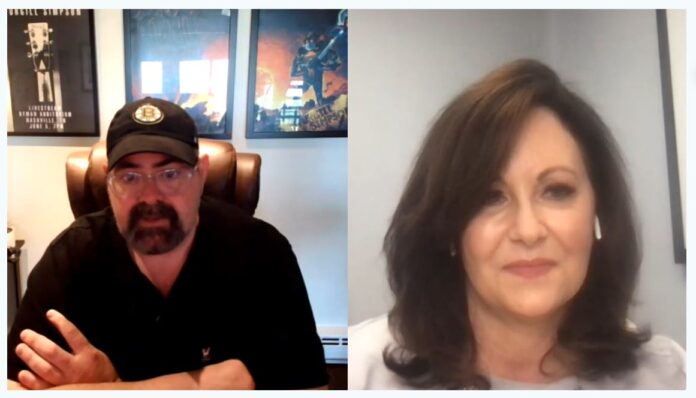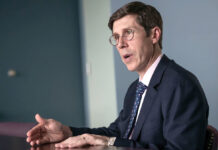
SMITHFIELD – The U.S. economy is on track for a full recovery from the COVID-19 pandemic, but more work needs to be done for the country to rebound from the devastating health crisis.
That was one of the multiple talking points mentioned Wednesday by Sirat Attapit, assistant trade representative for international affairs at the Office of the U.S. Trade Representative, and U.S. Commerce Secretary Gina M. Raimondo at the 36th annual World Trade Day, hosted by the John H. Chafee Center for International Business at Bryant University.
The annual event, held virtually this year and titled “The Future of Global Trade: Changes, Challenges and Opportunities,” hosted workshops and speakers offering perspectives on the global marketplace of the future.
In her afternoon keynote address that was an update on U.S. trade policy, Attapit said the country is starting to see positive outcomes from the American Rescue Plan Act, including vaccines and stimulus money distributed. The American Jobs and American Families plans would combine to make the U.S. a “safer, healthier and more prosperous and competitive nation,” Attapit said.
A worker-centric trade policy, Attapit said, is a key part of the White House’s Build Back Better agenda. She noted that President Joe Biden’s trade agenda reimagines trade policy by placing workers and families “at the heart of every decision” as trader policies have long overlooked impacts on workers and families trying to survive and thrive.
Raimondo, the former Rhode Island governor, said in a video message that many lives across the country, including in Rhode Island, were devastated by the pandemic and “severely disrupted” global supply chains. She said trade declined by 20%, exceeding the declines after the 2008 financial crisis.
Increasing engagement with international markets is vital to recovering economically from the pandemic, Raimondo said. She noted businesses that export are more likely to earn higher revenues, create jobs and pay higher wages than businesses that don’t export.
Raimondo said the U.S. Department of Commerce is working to strengthen “American competitiveness” so that the U.S. can be a strong trading partner globally.
“When the U.S. economy succeeds, the global economy succeeds with it,” Raimondo said.
Trade promotion will be prioritized in three areas, Raimondo said. First, is climate change, stating that trade is critical to facilitating low-carbon investments and technology access to drive “clean and sustainable development,” Raimondo said.
The second area Raimondo noted is travel and tourism, sectors that were severely impacted locally and nationally by the pandemic. Raimondo said U.S. Commerce is investing $750 million in those sectors to help them rebound.
Raimondo said that the Biden administration is promoting equitable economic growth to underserved communities and small businesses, particularly for minority- and women-owned businesses. Barriers are being eliminated, Raimondo said, and increasing support for such businesses by double.
Raimondo also said she wants U.S. trade to compete globally on a fair playing field.
“That means combating unfair trade practices from China and others who undercut American businesses,” Raimondo said. “It means reassuring jobs that have gone overseas so that America can continue producing world-class products for global markets.”
Earlier on Wednesday, Pete Mento, the head of a Washington, D.C.-based boutique trade and consulting firm and sponsor of the Trade Geek podcast, said opportunities to be more innovative are waiting on the other side of the COVID-19 pandemic, but it remains to be seen how society and economies dictate how that innovation is put to use.
During his 40-minute morning address during the trade event, Mento said he’s learned from the pandemic that despite major obstacles posed by the health crisis, Americans are not going to stop with their lives and will continue forward. He said society will do everything it can from a policy standpoint to kickstart the economy that has been ravaged by the pandemic.
“We know that a sociable economy, of people going out and living their lives, is what it’s going to take to bring our economy back on top,” said Mento, owner of Mento LLC.
However, it will take jobs, Mento said, and it will take the middle class getting back to work. Mento noted in his presentation that the Pew Research Centre stated the global middle class shrank for the first time since the 1990s. He also said other changes prompted by the pandemic, such as working from home, social distancing, mask-wearing and telehealth, will not go away.
Regarding automation, Mento also said that Americans eventually will move to a world where more time is spent putting people into jobs that focus on building machines that build the exported products.
“America is moving to an economy where ideas matter more than anything else,” Mento said. “Ideas are going to drive us forward.”
Mento said that many lessons learned during the pandemic have been a “humiliation for economists.” Everything that economists and society believed would happen as a result of the pandemic did not, such as the housing industry crashing, stock markets falling apart, e-commerce having delivery issues and Americans possibly stopping their “never-ending need to consume,” he said.
Mento said the world is now more interconnected than ever before, and the same interconnectivity that allowed COVID-19 to spread across the world also allowed the economy to continue to churn.
Mento said that with the pandemic, society at large had an “experiment” in which it was learned when Americans would truly embrace e-commerce. “We just found out,” Mento said. “They are embracing e-commerce and are not going back. What are we going to do to deal with it?”
Mento also mentioned that businesses are going to make their supply chains more resilient because they don’t want to be impacted by more tariffs on goods or impacted by another pandemic. He noted a survey by national law firm Foley & Lardner LLP that found that manufacturing executives are reexamining their global supply chain strategies.
According to the survey data, 70% said they are reducing their focus on sourcing from lowest-cost suppliers and emphasizing resilience instead; 62% are placing less focus on just-in-time inventory models; 43% have either withdrawn or plan to withdraw from China; and 42% plan to strengthen relationships and increase supply chain resiliency.
“They want to find a more diverse supply chain where they don’t have all of their eggs in one basket,” Mento said.
(UPDATED throughout to include statements from Sirat Attapit and Gina M. Raimondo.)
James Bessette is the PBN special projects editor, and also covers the nonprofit and education sectors. You may reach him at Bessette@PBN.com. You may also follow him on Twitter at @James_Bessette.












